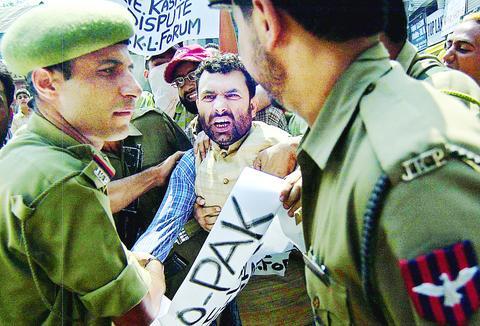India and Pakistan resolved to widen their peace dialogue yesterday as they discussed festering issues including their decades-old dispute over Kashmir.
India's Foreign Secretary Shyam Saran and his Pakistani counterpart Riaz Khokhar reviewed progress made in previous talks, paving the way for fresh dialogue to begin today. In a joint statement after the talks in New Delhi, the pair said talks had been "productive ... Several useful ideas and suggestions were made by both sides."

PHOTO: AP
India's External Affairs Minister Natwar Singh and Pakistani Foreign Minister Khursheed Kasuri were scheduled to meet in New Delhi today and tomorrow.
"The Foreign Secretaries discussed ways of taking the process forward," the statement said. "They would be reporting to the foreign ministers with the recommendation that the composite dialogue should be continued with a view to further deepening and broadening the engagement between the two sides."
At the heart of India-Pakistan tensions is Kashmir, where New Delhi has long accused Islamabad of arming Islamic militant groups who cross to the Indian side and carry out terrorist strikes.
The rebel groups have been fighting Indian security forces since 1989, seeking Muslim-majority Kashmir's independence from predominantly Hindu India or its merger with mostly Muslim Pakistan. More than 65,000 people have been killed in the conflict.
Islamabad denies New Delhi's charge that it helps the militant groups materially. Pakistan also says it is clamping down on rebels on its territory. But India says militants continue to cross from Pakistan-controlled Kashmir.
Sideshow
Meanwhile, as the diplomats met to push forward peace, their border guards play out a jingoistic ritual of confrontation for thousands of onlookers from both sides.
The display of hostility takes place every evening at a flag-lowering ceremony on both sides of the rivals' only border crossing.
Loudspeakers blare out patriotic Indian songs and soon the crowds at the Wagah border crossing begin to chant.
"Hail mother India!" is the cry from 8,000 Indians in a grandstand built beside the border gate, set amid green wheat fields.
"Long live Pakistan!" several thousand Pakistanis shout back from the other side of tall iron gates guarded by soldiers with assault rifles. "God is greatest."
The old rivals came close to a fourth war in 2002 but ties warmed last year, culminating in a summit between Pakistani President Pervez Musharraf and then Indian prime minister Atal Behari Vajpayee.
Crowds at the daily ceremony have swelled in the past couple of years to nearly 10,000 on the Indian side from a few hundred before, Indian border guards said.
Groups of Indian school girls dance in the stands and in the middle of the road as the music switches to a 1960s patriotic Bollywood song set to a modern tune.
The chanting reaches a crescendo as border guards dressed in ceremonial uniforms with tufted headgear begin a goose-step march to lower flags at the gate, stomping their boots with enough force to kick up dust on the asphalted road.
"The line between tourism and nationalism does not exist here," said a senior Indian officer.
"Military tensions are down and the soldiers are relaxed but it doesn't matter to the public. They get very excited."

PRECARIOUS RELATIONS: Commentators in Saudi Arabia accuse the UAE of growing too bold, backing forces at odds with Saudi interests in various conflicts A Saudi Arabian media campaign targeting the United Arab Emirates (UAE) has deepened the Gulf’s worst row in years, stoking fears of a damaging fall-out in the financial heart of the Middle East. Fiery accusations of rights abuses and betrayal have circulated for weeks in state-run and social media after a brief conflict in Yemen, where Saudi airstrikes quelled an offensive by UAE-backed separatists. The United Arab Emirates is “investing in chaos and supporting secessionists” from Libya to Yemen and the Horn of Africa, Saudi Arabia’s al-Ekhbariya TV charged in a report this week. Such invective has been unheard of

US President Donald Trump on Saturday warned Canada that if it concludes a trade deal with China, he would impose a 100 percent tariff on all goods coming over the border. Relations between the US and its northern neighbor have been rocky since Trump returned to the White House a year ago, with spats over trade and Canadian Prime Minister Mark Carney decrying a “rupture” in the US-led global order. During a visit to Beijing earlier this month, Carney hailed a “new strategic partnership” with China that resulted in a “preliminary, but landmark trade agreement” to reduce tariffs — but

Chinese President Xi Jinping’s (習近平) purge of his most senior general is driven by his effort to both secure “total control” of his military and root out corruption, US Ambassador to China David Perdue said told Bloomberg Television yesterday. The probe into Zhang Youxia (張又俠), Xi’s second-in-command, announced over the weekend, is a “major development,” Perdue said, citing the family connections the vice chair of China’s apex military commission has with Xi. Chinese authorities said Zhang was being investigated for suspected serious discipline and law violations, without disclosing further details. “I take him at his word that there’s a corruption effort under

China executed 11 people linked to Myanmar criminal gangs, including “key members” of telecom scam operations, state media reported yesterday, as Beijing toughens its response to the sprawling, transnational industry. Fraud compounds where scammers lure Internet users into fake romantic relationships and cryptocurrency investments have flourished across Southeast Asia, including in Myanmar. Initially largely targeting Chinese speakers, the criminal groups behind the compounds have expanded operations into multiple languages to steal from victims around the world. Those conducting the scams are sometimes willing con artists, and other times trafficked foreign nationals forced to work. In the past few years, Beijing has stepped up cooperation